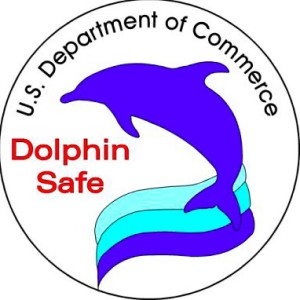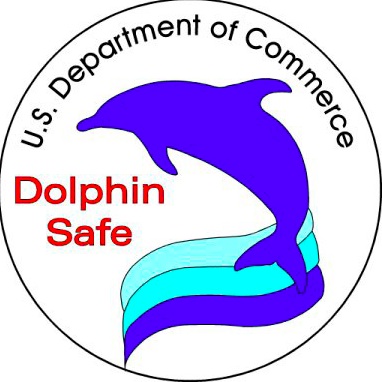 For the last quarter century, consumers of canned tuna in the United States have been assured by most of the brands on the supermarket shelves that what they are eating was caught without harming dolphins.
For the last quarter century, consumers of canned tuna in the United States have been assured by most of the brands on the supermarket shelves that what they are eating was caught without harming dolphins.
The dolphin-safe label of the Department of Commerce certifies that the tuna was caught using methods that did not involve the deliberate netting or encircling of dolphins, which frequently associate with schools of tuna in the Eastern Pacific Ocean.
For more than seven years, however, a group of non-profit organizations has been urging the National Marine Fisheries Service to broaden protections for marine mammals taken in the course of fishing for tuna.
In 2008, two of these groups – the Center for Biological Diversity and Turtle Island Restoration Network – petitioned the Departments of Commerce and Treasury to “enforce its non-discretionary duty under the Marine Mammal Protection Act” (MMPA). The petition sought to have NMFS
That act requires the Secretary of the Treasury to “ban the importation of commercial fish or products from fish which have been caught with commercial fishing technology that results in the incidental kill or incidental serious injury of ocean mammals in excess of United States standards.” In addition, the Secretary of Commerce is required to collect “reasonable proof” from fish-exporting nations of the effects of their fishing practices on marine mammals before those nations are allowed to sell products to the United States. If those effects exceed what is allowed under U.S. standards, the fish may not be imported.
Although the petition targeted the import of swordfish caught using methods that harmed marine mammals, the National Marine Fisheries Service “decided that the proposed rule would be broader in scope than the 2008 petition and is not limited in application to swordfish fisheries.” On April 30, 2010, it published an advance notice of proposed rulemaking to implement the MMPA.
More than five years passed before NMFS published its proposed rule – on August 11, 2015.
Spirit vs. Letter
Including the individuals who signed on to petitions circulated by environmental groups, tens of thousands of people commented on the rule by the time the comment period closed on November 9. The actual number of discrete comments was far smaller – around five dozen.
Many of those representing conservation and environmental organizations noted that, in the words of Leigh Henry and William Fox Jr., of WWF-US, “Fisheries bycatch is the greatest singular threat to marine mammals across the globe – it is responsible for more than 600,000 deaths each year.”
In their comments, eight other conservation groups – Animal Welfare Institute, Center for Biological Diversity, Defenders of Wildlife, Earthjustice, Natural Resources Defense Council, Humane Society of the United States, Turtle Island Restoration Network, and Whale and Dolphin Conservation – listed a number of species that have either gone extinct or have been threatened by fishing, including the North Atlantic right whale, the “critically imperiled vaquita in the Gulf of California, dusky and other dolphins off South American, New Zealand sea lions, and false killer whales on the high seas outside Hawai`i.”
Most conservation groups expressed concern that the proposed rules were vague in giving NMFS the ability to determine whether another nation’s standards were of comparable effectiveness to those of the United States. They were generally concerned over the exemptions for processed fish food (for example, fish sticks, fish oil, and fish cake) and they expressed disappointment with the five-year grace period that the proposed rules would grant to exporting countries before they would have to show compliance with standards comparable to those in the United States.
The Campaign for Eco-Safe Tuna, whose chief backers include the companies that make up Mexico’s tuna fleet and the fishing ministries of many Latin American countries, objected to the “comparability” standard as being far less stringent than the standards that have been imposed in the Eastern Tropical Pacific in connection with dolphin-safe tuna. It, along with the environmental organizations, also objected to a loophole allowing so-called intermediaries – countries that process fish and export fish products – to avoid full compliance with the proposed standards.
Mark J. Robertson, representing the campaign in Washington, D.C., pointed out that a study published last year in the journal Marine Policy found that “illegal tuna fishing in the Indian and Pacific Oceans is facilitated by the lack of seafood traceability when supplies are consolidated during trans-shipment at sea… [o]f the 85 percent of tuna imported by Thai processors, only 30 percent meets the relatively strict traceability requirements of the European Union … Much of the untraceable balance is what finds its way into the comparatively lax U.S. market.”
Against that, Robertson noted, “tuna fishing in the [Eastern Tropical Pacific] is strictly monitored through the comprehensive, legally binding multilateral tracking and verification system established under the [Agreement on International Dolphin Conservation Program], a treaty to which the United States is signatory.” He compared the observer program in the Eastern Pacific, which has a high standard for observer training to that in the Western and Central Pacific, where “the observers are, for the most part, merely elements of programs of individual island nations, who report data back only to those nations… Training and other data-collection is sporadic and not regularly shared with the regional fishery management organization.”
“There are holes in these proposed regulations big enough to drive a purse seiner through,” Robertson wrote, “and in our judgment, NMFS has taken excessive license with the concept of comparability.”
In contrast to the environmental groups, which criticized the proposed rules for their laxity, comments from representatives of the fishing industry and fish processors found the rules far too stringent.
Rod Moore, executive director of the West Coast Seafood Processors Association, raised the prospect of retaliatory bans on U.S. exports from countries that are found to be non-compliant with U.S. standards to protect marine mammals. “Is anyone in NMFS paying attention to the real world or are you all busy navel-gazing there in Silver Spring?” Moore wrote, referring to the Maryland suburb of Washington where NMFS has its headquarters.
Ryan Steen, an attorney representing the Hawai`i Longline Association, was more circumspect in his comments, noting that the HLA “supports NMFS’s goal to hold foreign countries exporting fish and fish products to the United States accountable to the robust standards that have been applied to domestic commercial fisheries for decades.” But Steen went on to point out that the regulations would be cumbersome and impose “a significant administrative burden” on NMFS. “Absent additional funding and staffing, the proposed rule threatens to come at the expense of further delaying the processes under which domestic fisheries are permitted and authorized.”
In sum, however, Steen wrote, “HLA supports the goal of the proposed rule to level the playing field between foreign fisheries and U.S. commercial fisheries.”
Kitty Simonds, writing on behalf of the Western Pacific Fishery Management Council, was harsher, criticizing the MMPA itself. “The Council has found that the implementation of these provisions [to protect marine mammals] is resource intensive and struggles from limited resources and data, yet has the potential to result in increased restrictions on U.S. fisheries while providing little conservation benefit to the marine mammal stocks,” she wrote. “Additionally,” she continued, “the overall benefits to marine mammal populations … are likely to be limited given that the regulations will not affect foreign fisheries not exporting products to the U.S.”
— P.T.


Leave a Reply